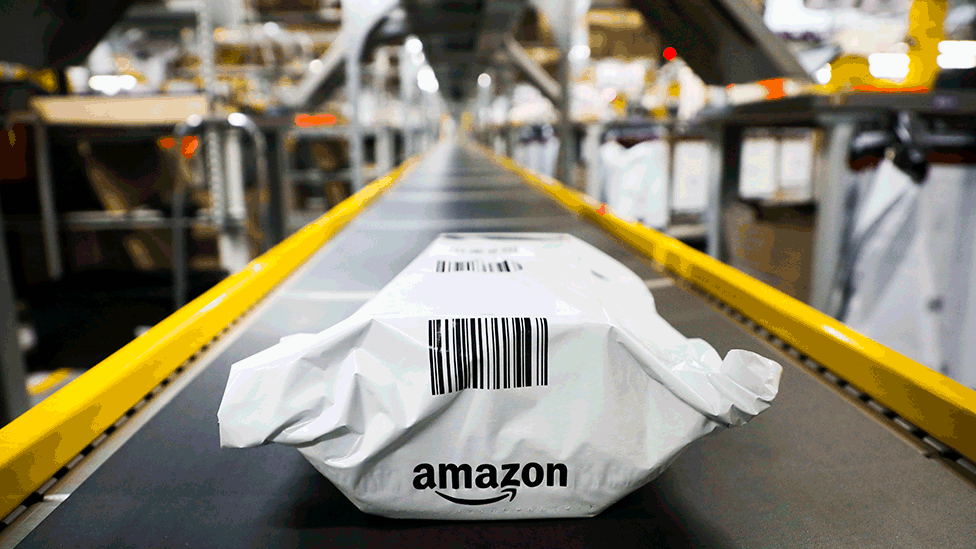Amazon pays £492m in UK tax as sales surge to £20.6bn
- Published
- comments

Online shopping giant Amazon has said it is "proud" of its contribution to the UK economy, as it reveals its latest financial results.
The firm paid £492m in direct taxation as its sales rose 50% to £20.63bn, amid a Covid-driven surge in demand.
Amazon and other tech firms, which pay tax on profits not sales, have faced scrutiny over the level of their tax bills in the UK.
But Amazon said it had invested £32bn in UK infrastructure since 2010.
"We are proud of the significant economic contribution we are making to the UK economy," Amazon said in a statement., external
"Looking ahead, we know that the UK remains full of opportunity and we continue to be excited by the potential to continue to invest, create jobs, develop talent and have a positive impact in communities across the country," the statement added.
Amazon's total sales in the UK, rose to £20.63bn during 2020 - up by more than 50% from £13.73bn in 2019.
The direct tax bill was up by more than two-thirds compared with the £293m it paid in the previous year.
The firm, which employs 55,000 people in the UK, said the taxes included business rates, stamp duty, corporation tax and other contributions.
Amazon said employers' national insurance taxes accounted for the majority of the bill as it took on 22,000 more staff over the course of the last year.
The company's indirect tax bill came to £1.06bn, up from £854m, driven by VAT on increased sales and employee taxes, as it took on more people and increased wages.
Amazon said that when both direct and indirect taxation were taken into account, it had contributed £1.55bn, up from £1.15bn.
'Get a grip'
GMB, the union for Amazon workers, said the company's tax bill was "frankly insulting" and said firms that had profited from the pandemic should pay more.
Mick Rix, GMB National Officer, said:"Amazon workers suffer unsafe, dehumanising work practices; breaking bones, falling unconscious and being taken away in ambulances.
"Ministers must get a grip of this runaway company and make sure pandemic profiteers pay more.
"Amazon's key UK business paid just £3.8m more corporation tax last year than in 2019, even as sales increased by £1.89bn."
In April last year, the UK government launched a 2% tax on digital sales amid concerns that big tech firms were re-routing their profits through low tax jurisdictions. The Digital Services Tax is also included in the £492m figure.
Chancellor Rishi Sunak said in June last year that the coronavirus crisis had made tech giants even "more powerful and more profitable".
Other global tech firms have faced similar scrutiny, external over their tax bills.
French tax authorities recently settled disputes with Facebook, Google, Apple and Amazon over their operations in the country over the last decade.
Last year, Facebook boss Mark Zuckerberg said he recognised the public's frustration over the amount of tax paid by tech firms and backed plans by think tank the Organisation for Economic Co-operation and Development (OECD) to find a global solution.
'Legally compliant but opaque'
"As usual the accounts are legally compliant but opaque and lack the crucial information about intra-group transactions which enable the company to shift profits is not there," said Labour peer and emeritus professor of accounting at the University of Sheffield and University of Essex, Prem Sikka.
"Therefore it's impossible to know what their true economic profit is," Prof Sikka said.
Given the profits declared by competitors, Prof Sikka said Amazon's tax bill "seems very low", whereas, for retailers such as supermarket chains, tax bills as a proportion of sales were much higher.
"We need a complete change in accounting regulations which currently increase opacity rather than transparency," Prof Sikka added.
Professor of taxation law at King's College London, Ann Mumford agreed and said that there was a lack of public discussion around the rules which led to this amount of tax.
"It seems that Amazon realised that they would need to pay a respectable amount - and, are hoping that an increase of £3.8 million sounds like a lot of money," Prof Mumford added.

Analysis by Sarah Corker, BBC business correspondent
The pandemic has accelerated the shift towards online shopping and Amazon has been one of the biggest winners amid those changing consumer trends.
As Covid closed physical stores during successive lockdowns, sales at the internet giant rocketed.
Today's numbers will raise further questions about how tech giants operate, the level of tax they pay and their impact on the struggling High Street.
Amazon moved to fend off criticism by pointing out that its direct tax bill increased by more than two-thirds from the £293m it paid in 2019.
Critics say that's still nowhere near enough given the surge in sales.
The firm's been on a hiring spree to meet soaring demand, offering a £1,000 joining bonus to encourage staff to work in its fulfilment centres in the north east of England.

Related topics
- Published1 September 2021
